Related Research Articles

Juvenile delinquency, also known as juvenile offending, is the act of participating in unlawful behavior as a minor or individual younger than the statutory age of majority. In the United States of America, a juvenile delinquent is a person who commits a crime and is under a specific age. Most states specify a juvenile delinquent, or young offender, as an individual under 18 years of age while a few states have set the maximum age slightly different. In 2021, Michigan, New York, and Vermont raised the maximum age to under 19, and Vermont law was updated again in 2022 to include individuals under the age of 20. Only three states, Georgia, Texas, and Wisconsin still appropriate the age of a juvenile delinquent as someone under the age of 17. While the maximum age in some US states has increased, Japan has lowered the juvenile delinquent age from under 20 to under 18. This change occurred on April 1, 2022 when the Japanese Diet activated a law lowering the age of minor status in the country. Just as there are differences in the maximum age of a juvenile delinquent, the minimum age for a child to be considered capable of delinquency or the age of criminal responsibility varies considerably between the states. Some states that impose a minimum age have made recent amendments to raise the minimum age, but most states remain ambiguous on the minimum age for a child to be determined a juvenile delinquent. In 2021, North Carolina changed the minimum age from 6 years old to 10 years old while Connecticut moved from 7 to 10 and New York made an adjustment from 7 to 12. In some states the minimum age depends on the seriousness of the crime committed. Juvenile delinquents or juvenile offenders commit crimes ranging from status offenses such as, truancy, violating a curfew or underage drinking and smoking to more serious offenses categorized as property crimes, violent crimes, sexual offenses, and cybercrimes.

His Majesty's Prison Service (HMPS) is a part of HM Prison and Probation Service, which is the part of His Majesty's Government charged with managing most of the prisons within England and Wales.
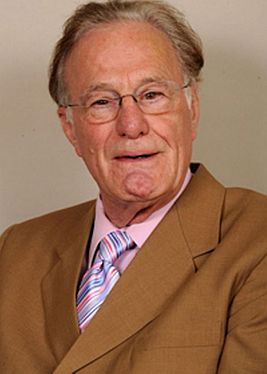
Robin Corbett, Baron Corbett of Castle Vale was a British Labour Party politician and journalist.

Rehabilitation is the process of re-educating and preparing those who have committed a crime, to re-enter society. The goal is to address all of the underlying root causes of crime in order to ensure inmates will be able to live a crime-free lifestyle once they are released from prison. It generally involves psychological approaches which target the cognitive distortions associated with specific kinds of crime committed by individual offenders, but it may also entail more general education like reading skills and career training. The goal is to re-integrate offenders back into society.
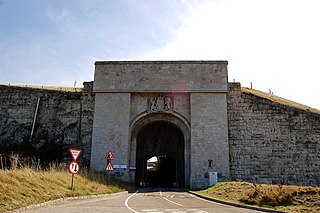
HM Prison The Verne is a Category C men's prison, located within the historic Verne Citadel, on the Isle of Portland in Dorset, England. Operated by His Majesty's Prison Service, HMP The Verne was established in 1949 and occupies the southern part of the citadel. After a brief spell as an Immigration Removal Centre in 2014–2017, HMP The Verne re-opened in 2018.

HM Prison Frankland is a Category A men's prison located in the village of Brasside in County Durham, England. Frankland is operated by His Majesty's Prison Service.
In the United Kingdom, prisoners are divided into four categories of security. Each adult is assigned a category, depending on the crime committed, the sentence, the risk of escape, and violent tendencies. The categories are single letters, in alphabetical order, with 'A' as the most secure, and 'D' the least.
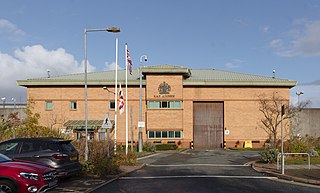
HM Prison Altcourse is a Category B men's private prison and Young Offender Institution in the Fazakerley area of Liverpool in Merseyside, England. The prison is operated by Sodexo.

HMP Peterhead was a prison in Peterhead in Aberdeenshire, Scotland, operating from 1888 to 2013. Since June 2016, the former grounds operate as the Peterhead Prison Museum.

HM Prison Styal is a Closed Category prison for female adults and young offenders in Styal, Cheshire, England. The prison is operated by His Majesty's Prison Service.

HM Prison Ashfield is an adult male sex offenders prison located in the village of Pucklechurch, in South Gloucestershire, England. The prison is operated by Serco.
HM Prison Whatton is a Category C men's prison, located in the village of Whatton, near Bingham in Nottinghamshire, England. The prison is operated by His Majesty's Prison Service, and houses males convicted of sexual offences.

His Majesty's Prison Lewes is a local category B prison located in Lewes in East Sussex, England. The term local means that the prison holds people on remand to the local courts, as well as sentenced prisoners. The prison is operated by His Majesty's Prison Service.
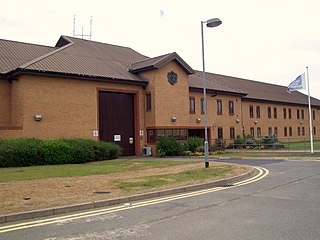
HM Prison Littlehey is a Category C male prison in the village of Perry near Huntingdon in Cambridgeshire, England. Littlehey Prison is operated by His Majesty's Prison Service. The Prison only holds those that have been convicted of a sexual offence.
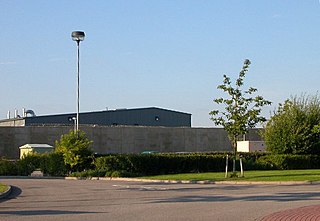
HM Prison Rye Hill is a Category B men's private prison, operated by G4S. Rye Hill has exclusively housed sex offenders since 2014. The prison is next to HMP Onley and Rainsbrook Secure Training Centre, south of Rugby, in the parish of Barby, Northamptonshire, England. However, the postal address of the prison is Willoughby, Warwickshire; therefore, most sources list the prison as in Willoughby, Warwickshire.
HMP New Hall is a Closed Category prison for female adults, juveniles and young offenders. The prison is located in the village of Flockton in West Yorkshire, England. New Hall is operated by His Majesty's Prison Service.
Nottinghamshire Healthcare NHS Foundation Trust, based in Nottinghamshire, England, manages the UK’s largest and most integrated Forensic High Secure facility Rampton Hospital near Retford, High Secure Women’s, High Secure Deaf, High Secure Learning Disability and Autistic as well as High Secure Men’s Mental Health), two medium secure units, Arnold Lodge in Leicester and Wathwood Hospital in Rotherham, and a low Secure Unit, the Wells Road Centre at Mapperley in Nottingham.

Storybook Dads is a non-profit charity in the UK founded by Sharon Berry and first launched in HM Prison Dartmoor in 2003. The charity enables serving prisoners and detainees to record bed time stories which can then be sent home to their children, and aims to maintain connections between serving prisoners and their families. In women's institutions the project operates under the name Storybook Mums.
References
- ↑ "SAFER LIVING FOUNDATION Charity number: 1155788". Charity Commission for England and Wales. Retrieved 12 March 2021.
- 1 2 3 Stanford, Peter (1 March 2015). "Their crimes provoke repulsion but it is our duty to rehabilitate sex offenders" . Retrieved 12 March 2021.
- ↑ "Charity seeks volunteers to help HMP Whatton sex offenders". 26 February 2014. Retrieved 12 March 2021.
- 1 2 Kitson-Boyce, Rosie; Blagden, Nicholas; Winder, Belinda; Dillon, Gayle (15 March 2019). "Supporting Desistance Through Ambiguous Practice: What Can Be Learned From the First Prison-Based Model of CoSA in England and Wales?" (PDF). Journal of Forensic Psychology Research and Practice. 19 (2): 186–209. doi:10.1080/24732850.2019.1571362. S2CID 150559053 . Retrieved 12 March 2021.
- 1 2 Kitson-Boyce, Rosie; Blagden, Nicholas; Winder, Belinda; Dillon, Gayle (December 2019). ""This Time It's Different" Preparing for Release Through a Prison-Model of CoSA: A Phenomenological and Repertory Grid Analysis" (PDF). Sexual Abuse. 31 (8): 886–907. doi:10.1177/1079063218775969. PMID 29790431. S2CID 46893281 . Retrieved 12 March 2021.
- 1 2 Kitson-Boyce, Rosie; Blagden, Nicholas; Winder, Belinda; Dillon, Gayle (2 September 2018). "A prison-model of CoSA: The potential to offer "through the gate" support and accountability" (PDF). Journal of Sexual Aggression. 24 (3): 294–310. doi:10.1080/13552600.2018.1509575. S2CID 150176316 . Retrieved 12 March 2021.
- 1 2 3 4 "Social and community impact category: award winner and runners up". 17 March 2016. Retrieved 12 March 2021.
- 1 2 Hocken, Kerensa; Saunders, Lynn; Lievesley, Rebecca (18 October 2018). The Safer Living Foundation Prevention Programme: An Introduction to the UK's First Group Based Programme for the Primary Prevention of Sexual Offences (PDF). 2018 ATSA Conference. Retrieved 12 March 2021.
- ↑ Hackett, Simon; Smith, Stephen (27 April 2018). "Young people who engage in child sexual exploitation behaviours : an exploratory study" (PDF). Durham Research Online. Centre for Expertise on Child Sexual Abuse. Retrieved 12 March 2021.
- 1 2 Byrne, Imogen (8 November 2019). An Evaluation of Young People's Circles of Support and Accountability (PDF). 2019 ATSA Conference. Retrieved 12 March 2021.
- ↑ "Report on a scrutiny visit to HMP Whatton by HM Chief Inspector of Prisons" (PDF). Her Majesty’s Inspectorate of Prisons. Retrieved 12 March 2021.
- 1 2 Whitfield, David (11 February 2019). "Anger from victims of abuse as new centre opens to help 100 sex offenders back into society". Nottinghamshire Live. Retrieved 12 March 2021.
- 1 2 Townsend, Mark (9 February 2019). "University launches scheme to rehabilitate sex offenders This article is more than 2 year". The Guardian. Retrieved 12 March 2021.
- ↑ "THE CORBETT CENTRE FOR PRISONER RE-INTEGRATION". The Corbett Network. Retrieved 12 March 2021.
- ↑ "SOCAMRU Prevention Conference 2020 - event postponed". Nottingham Trent University. Retrieved 12 March 2021.
- ↑ Lievesley, Rebecca; Hocken, Kerensa; Elliott, Helen; Winder, Belinda; Blagden, Nicholas; Banyard, Phil (2018). Sexual Crime and Prevention (1st ed.). Palgrave Macmillan. doi:10.1007/978-3-319-98243-4. ISBN 978-3-319-98242-7.
- ↑ Elliott, Helen; Hocken, Kerensa; Lievesley, Rebecca; Blagden, Nicholas; Winder, Belinda; Banyard, Phil (2018). Sexual Crime and Circles of Support and Accountability (1st ed.). Palgrave Macmillan. doi:10.1007/978-3-319-74823-8. ISBN 978-3-319-74822-1.
- ↑ Blagden, Nicholas; Winder, Belinda; Hocken, Kerensa; Lievesley, Rebecca; Banyard, Phil; Elliott, Helen (2019). Sexual Crime and the Experience of Imprisonment (1st ed.). Palgrave Macmillan. doi:10.1007/978-3-030-04930-0. ISBN 978-3-030-04929-4.
- ↑ Winder, Belinda; Blagden, Nicholas; Hocken, Kerensa; Swaby, Helen; Lievesley, Rebecca; Banyard, Phil (2019). Sexual Crime, Religion and Spirituality (1st ed.). Palgrave Macmillan. doi:10.1007/978-3-030-26040-8. ISBN 978-3-030-26039-2. S2CID 239296437.
- ↑ Swaby, Helen; Winder, Belinda; Lievesley, Rebecca; Hocken, Kerensa; Blagden, Nicholas; Banyard, Phil (2020). Sexual Crime and Trauma (1st ed.). Palgrave Macmillan. doi:10.1007/978-3-030-49068-3. ISBN 978-3-030-49067-6. S2CID 228963937.
- ↑ Hocken, Kerensa; Lievesley, Rebecca; Winder, Belinda; Swaby, Helen; Blagden, Nicholas; Banyard, Phil (2020). Sexual Crime and Intellectual Functioning (1st ed.). Palgrave Macmillan. doi:10.1007/978-3-030-52328-2. ISBN 978-3-030-52327-5. S2CID 241616174.
- ↑ Robinson, Adele (16 April 2019). Special report: Inside the 'Circle'. Sky News. Retrieved 12 March 2021.
- ↑ Can sex offenders and violent criminals be rehabilitated in prison?. BBC Radio. 13 October 2019. Retrieved 12 March 2021.
- ↑ Can sex offenders change? Oestrogen and Covid; Childless older women. BBC Sounds. 18 August 2020. Retrieved 12 March 2021.
- ↑ Southworth, Becky (20 August 2020). Can Sex Offenders Change?. BBC. Retrieved 12 March 2021.
- ↑ "WINNERS 2019". Third Sector Awards. Retrieved 12 March 2021.
- ↑ Williams, Rachel; Thomas, Kim; Jackson, Linda; Dudman, Jane; Andalo, Debbie; Johnson, Sarah (28 November 2018). "Guardian Public Service Awards 2018: all the winners". The Guardian. Retrieved 12 March 2021.
- ↑ Dudman, Jane (30 December 2016). "Public servants celebrated in 2017 New Year honours list". The Guardian. Retrieved 12 March 2021.
- ↑ "DR KERENSA HOCKEN (HMP Whatton)". The Butler Trust. Retrieved 12 March 2021.
- ↑ "2015 WINNER: SAFER LIVING". The Robin Corbett Award. Retrieved 12 March 2021.
- ↑ "2018 Community Awards Winners". The Howard League for Penal Reform. Retrieved 12 March 2021.
- ↑ "2019 Community Awards Winners". The Howard League for Penal Reform. Retrieved 12 March 2021.
- ↑ "STUART RODERICK (HMP Whatton)". The Butler Trust. Retrieved 12 March 2021.